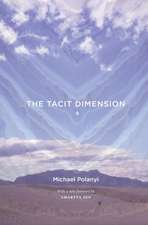A Social Epistemology of Research Groups: New Directions in the Philosophy of Science
Autor Susann Wagenknechten Limba Engleză Paperback – 24 apr 2019
| Toate formatele și edițiile | Preț | Express |
|---|---|---|
| Paperback (1) | 480.44 lei 43-57 zile | |
| Palgrave Macmillan UK – 24 apr 2019 | 480.44 lei 43-57 zile | |
| Hardback (1) | 525.54 lei 43-57 zile | |
| Palgrave Macmillan UK – 19 dec 2016 | 525.54 lei 43-57 zile |
Preț: 480.44 lei
Nou
Puncte Express: 721
Preț estimativ în valută:
91.96€ • 99.92$ • 77.30£
91.96€ • 99.92$ • 77.30£
Carte tipărită la comandă
Livrare economică 21 aprilie-05 mai
Preluare comenzi: 021 569.72.76
Specificații
ISBN-13: 9781349706709
ISBN-10: 1349706701
Pagini: 187
Ilustrații: IX, 187 p.
Dimensiuni: 148 x 210 mm
Greutate: 0.25 kg
Ediția:1st ed. 2016
Editura: Palgrave Macmillan UK
Colecția Palgrave Macmillan
Seria New Directions in the Philosophy of Science
Locul publicării:London, United Kingdom
ISBN-10: 1349706701
Pagini: 187
Ilustrații: IX, 187 p.
Dimensiuni: 148 x 210 mm
Greutate: 0.25 kg
Ediția:1st ed. 2016
Editura: Palgrave Macmillan UK
Colecția Palgrave Macmillan
Seria New Directions in the Philosophy of Science
Locul publicării:London, United Kingdom
Cuprins
1. Introduction.- 2. Research Groups.- 3. Method.- 4. The Planetary Science Group.- 5. The molecular Biology Laboratory.- 6. Division of Labour.- 7. Epistemic Dependence.- 8. Epistemic Trust.- 9. Collaboration and collective knowledge.- 10. Concluding remarks.
Recenzii
“Susann Wagenknecht has written an important book that uses empirical methods for testing and refining philosophical theories about the nature and collaborative creation of scientific knowledge. …I believe this is the first book that makes a serious attempt to study these philosophical topics with an empirical methodology. The book delivers important insights and is recommended reading for both philosophers and social scientists interested in epistemic collaboration and creation of scientific knowledge.” (Raul Hakli, Metascience, July, 2018)
Notă biografică
Susann Wagenknecht is an interdisciplinary researcher at the intersection of philosophy of science, social epistemology, and qualitative empirical methods. She received her PhD from Aarhus University, Denmark, in 2014. Since then, she has published on epistemic trust and dependence in Episteme and Social Epistemology; and co-edited together with Hanne Andersen and Nancy J. Nersessian the volume Empirical Philosophy of Science (Springer, 2015).
Textul de pe ultima copertă
This book investigates how collaborative scientific practice yields scientific knowledge. At a time when most of today’s scientific knowledge is created in research groups, the author reconsiders the social character of science to address the question of whether collaboratively created knowledge should be considered as collective achievement, and if so, in which sense. Combining philosophical analysis with qualitative empirical inquiry, this book provides a comparative case study of mono- and interdisciplinary research groups, offering insight into the day-to-day practice of scientists. The book includes field observations and interviews with scientists to present an empirically-grounded perspective on much-debated questions concerning research groups’ division of labor, relations of epistemic dependence and trust.
Caracteristici
Combines empirical research and philosophical analysis to offer new insight into research practice Provides readers with a distinct approach to integrating philosophical analysis with first-hand qualitative data Reflects researchers’ continued interest in the inner workings of interdisciplinary research

































